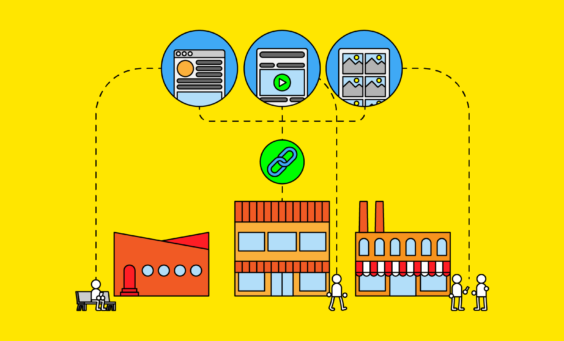
How to Do Local Link Building the Right Way
Last updated on February 17th, 2025
If you’re marketing a local business online, earning quality local links isn’t just good for local SEO, it’s good for business, too.
So what is local link building?
Local link building is the practice of acquiring links from other local websites. For example; local news sites, other local businesses, local bloggers, or local directories. The key thing with a local link is that it should come from a site that is location-specific to your own area of operation.
This is where it differs from traditional SEO link building. Generally, with traditional link building, while relevance is key, you may be going after hundreds or thousands of links from huge websites, which can be a much more difficult task. The key to building local links is building relationships in your local area, which may feel like a much smaller task.
Does link building affect local SEO?
You might not be asking, “is link building still relevant to SEO”? But you may be questioning whether it’s really worth investing in building links that won’t have immediate SEO benefits.
Simply put, local link building is well worth investing time into. And that’s beyond the impact on search.
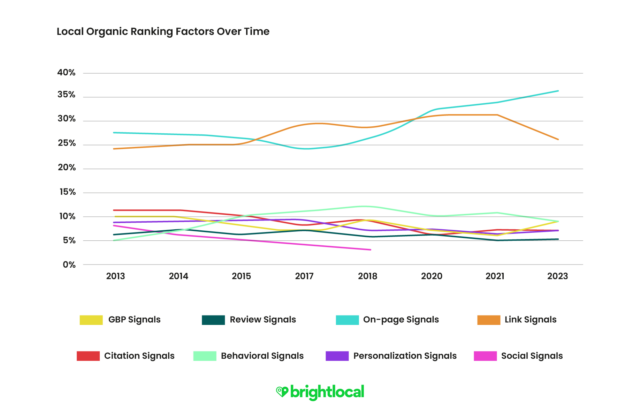
For starters, links from relevant local sources are regularly mentioned as a local ranking factor. That means that getting relevant links can improve your site’s ranking in local organic searches and your Google Business Profile in the Local Pack. As the above table shows, ‘link signals’ are one of the biggest ranking factors for the local organic results. It’s not quite so significant for the local pack, but the same study found links to still be the 4th biggest factor for the local pack.
There’s a reason tools like Local Search Grid show you how many links you have in comparison to your competitors.
Other Benefits of Local Link Building
Building awareness is an often-overlooked benefit of earning local links. When potential customers or clients begin the research and discovery phase of their journey, they are looking for answers, resources, education, data, opinions, and insights from sources they know, like, and/or trust. Earning links to your site/pages from these sources can be a remarkably effective way to get on their radar.
A link from a local chamber of commerce, for example, could replicate the impact of search visibility within that local chamber’s membership. If you’re a business looking to get in front of other businesses, having a link from a chamber of commerce page, blog post, or news article will deliver targeted, effective visibility, placing your business directly in the line of vision of other local business decision-makers. Is that not exactly what you ultimately hope to achieve by improving your local SEO?
Directories and review sites are also useful too. Here’s an example for someone looking for the best place to buy meat in Chicago:

How do I create a local backlink?
Being told to go out there and build local links can be daunting. But the truth is, there are lots of avenues to explore once you know where to look.
Acquiring local links from business directories and review sites is really ticket-to-entry local link building for awareness. In terms of deciding which sites to prioritize, start with the directories that appear most prominently for relevant awareness search queries. These are likely to include a combination of the major citation sites (i.e. Yelp), as well as vertical-specific business listing sites (i.e. a legal directory like FindLaw).
In addition to directories, other ‘local links for awareness’ options include:
- Local blogs (contributing and commenting)
- Local news
- Local community forums
Even if the searcher isn’t ready to make a purchase now, having links from these sites reinforces brand awareness and builds confidence and trust.
Free Course: How to Master Local Link Building
It’s also worth mentioning that, while we’re focusing on actual local hypertext links here, you certainly shouldn’t ignore linkless citations.
In addition to building awareness, local link building is also an effective way to drive qualified leads. Identifying local partners who share a target audience similar to yours is a great way to generate both links and leads.
How many local links do you need?
There’s no definitive answer to this question—links are just one piece of a larger puzzle. You may regularly find sites with a handful of links outranking those with thousands. It often comes down to:
- The relevance of the website to the searcher’s needs.
- The quality of the content on that site.
- The relevance of the sites linking to them—for example, a dental practice having a few links from a dental news sites and local press could be doing better than one that only has links from lifestyle publications, for instance.
- The relevance of the link itself—why are they linking?
There’s a host of things that can make one link more impactful than another. However, in your local area, comparing how many links you have to your direct competitors can give you a good start on the number of linking domains you may need.
You can do this quickly with a Local Search Grid report.
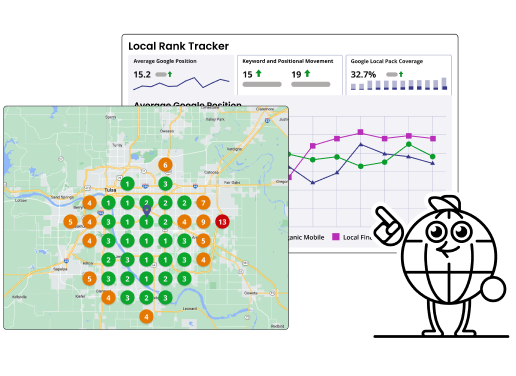
Put Your Rankings on the Map. Literally.
Track and improve rankings with BrightLocal
Nine Local Link-building Strategies
Building local links for business is also about “getting out there” in your local community. It’s been said that the best links tend to grow from building great relationships.
1. Find Local Sponsorship Opportunities
Local sponsorships are a good example. Use links from a sponsorship page to drive leads for a specific offer that is highly relevant to the audience of the sponsored group, organization, or team. Think local sports shops sponsoring local youth sports teams and offering team-specific discounts, for example.
Not sure how to go about finding sponsorship opportunities? NiftyMarketing’s Mike Ramsey suggests performing custom searches to identify potential sponsorship requests in the target area:
You can also find local sponsorship opportunities by using custom searches like:
inurl:sponsors “City name”
intitle:sponsors “City name”
intext:sponsors “City name”

2. Get Involved with Local Events
Finding popular existing local events can provide all sorts of opportunities. Where does your local community congregate? Where are these events published online? In many cases, local government sites get involved in promoting these events, along with local Facebook Groups. These are fantastic opportunities to earn links that also generate leads. Look for event sites that have a track record of linking back to partners and contributors.
3. Consider Offering Scholarships
Scholarships also remain a really effective link building tactic. Consider offering local scholarships to students who might also be customers. Going back to the sports shop analogy, offer a scholarship to a local student-athlete who excels both on the field, as well as in the classroom. You might be surprised just how effective this can be for generating goodwill, building brand awareness, and building local links.
4. Look at Local Community Sites
Community sites such as local jobs boards, local not-for-profit sites, community groups, community radio stations, TV channels and newspapers, food banks, churches, and similar are additional sources of local links.
You could consider donating your expertise to a cause, providing a helpful resource, writing a news article to share with local media, holding a community open day, or even offering to host a fundraiser in your space.
Many community organizations welcome local business participation and in turn, you’ll obtain a local link and raise your brand visibility amongst local community members.
5. Support Your Local Charities
Local charities faced an uphill struggle during the COVID-19 pandemic with a drop in funding and donations and an increase in people needing to access their services. This isn’t a situation that looks likely to change anytime soon, making their role within our communities more vital than ever.
As a local business owner, you may well have an area of expertise or a resource that could make a positive impact on a local charity close to your heart. Whether that’s donating time, goods, or expertise to make a positive difference within your community, there is a clear opportunity to give back while also local link building for SEO.
Most charities will have social media pages and a website where they share updates about donors and drives, so it’s quite feasible you could generate a local link while also making a real-world contribution.
6. Connect with local creatives
You can use your expertise to help more than just charities. Building a reputation as someone who knows their stuff in their field can also be leveraged for local link building.
Think about the creative scene in your town or city. Are there any local podcast hosts? Local reporters who work freelance? Local theatre groups? Each of these people may find themselves in need of local guests and local experts at one time or another.
If you can build your profile locally, you increase your chances of being asked to appear on a future podcast episode, be interviewed by a local radio station, partner on a webinar, or host a seminar or panel discussion.
7. Create Local Case Studies
Consider local case studies which highlight your work with other local businesses, charities, and organizations. If you’ve gone out of your way to make a difference to someone in your community, perhaps by giving them a favorable rate, helping them with an urgent problem, or by donating goods or services, consider asking them to share a case study, include your link on their site with a logo or provide a testimonial.
8. Create an Ongoing Column with your Local Paper or News Site
Put yourself forward as a local columnist with your area’s newspaper, prominent blog, or media outlet. Typically, local media outlets are welcoming of knowledgeable contributors and they will often include a short biography of the author, sometimes with an image and link. This can also be a great way to build your local visibility as a trusted expert, a local business leader, and a subject matter expert.
9. Apply to speak at local events
Speaking can further boost your personal and business brand and you might find that you get a link back from the event website too. Finding out what business expos and seminars going on in your area can be as simple as scouring the what’s on listing of your local venue.
Keep an eye out for any events that fit your area of business. Expos and seminars will often require guest speakers to give talks, deliver seminars, and present keynote speeches. And you’ll often find that each speaker receives a bio on the event website along with a link, in addition to being included in the event’s marketing materials such as pre-show blog posts and local and industry news releases.
Local links generate customers and clients. In fact, if you’ve already acquired some of the links that we discussed here, they’ve likely been helping you to win more business already.
You can mine referral data and configure Analytics goals to capture the business impact of your local links.
Four Traditional Link-building Tactics to Help Build Local Links
Now I want to run you through a handful of tactics that apply to any business looking to build links. Remember though, the key here is to use these to build relevant links. Some of these may appear quick and easy on the surface, but might end up taking considerable time and effort.
1. Look at Your Competitor’s Links
While having the same links won’t be enough to beat your competitors, it can at least help you close the gap or get in front of the same people as them.
A tool like BrightLocal’s Local Search Grid can show you how many links you have compared to your ranking competitors for your chosen keywords, as shown in the screenshot below.
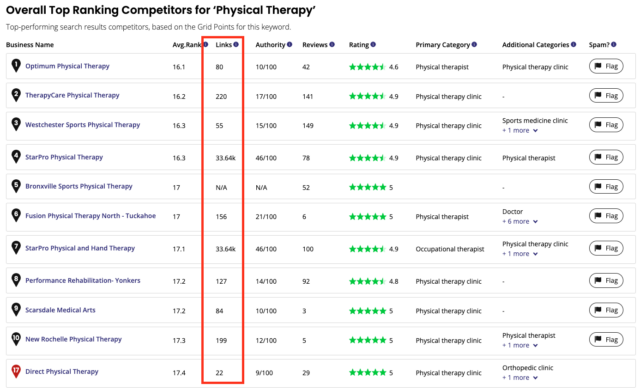
This screenshot shows that numerous businesses outrank Direct Physical Therapy. While some of them have thousands of links because they’re part of a larger network, a few of the smaller competitors only have a few more. This is where you’ll want to look.
Once you’ve found out who your local competitors really are, you can use SEO tools like Ahrefs or Semrush to perform a link intersect. These tools let you see who your competitors are getting links from and how.
A good place to start, though, is putting the competing website into one of these tools and looking at their referring domains. I’ve done this below using Ahrefs. This is simply using the referring domains tool for a website’s URL.
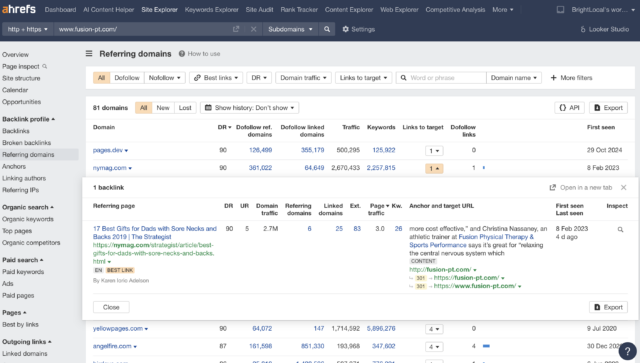
If you use the referring domains, it will group all the links by domain, and you’ll be able to see which ones they have. The above example highlights a link from the local publisher ‘nymag.com’.
Then, you can work out whether it’s a link you want to try and replicate. In some cases, it could be as simple as contacting the site to ask, especially if it’s a listicle or something like that. Sometimes, you may need to do more to earn those links, though.
Remember, just because a competitor has a link, it doesn’t mean you need it. Assess the quality and relevance before trying to replicate what they’ve done.
2. Link Reclamation
These are links that you used to have, but now they go to either a dead page or the wrong page because of a redirect.
Enter your site into an SEO tool and check for links from external sources that are pointing to a 404 page. Then, get in touch and let them know the best place for them to link instead.
3. Track Brand Mentions
There’s always a chance that people are already talking about your business and simply not linking to it.
If you’re particularly active in your local community already, or you’ve been providing comments for news stories, this is a strategy worth your time. There are a number of tools available to help you track brand mentions.
If you find a mention that isn’t linking, simply get in touch and ask if they will. Remember, some sites may have a no-link policy, so don’t be surprised if you get a ‘no’ back.
4. Content Marketing and Digital PR
One of the more time-consuming and potentially expensive tactics for building links is through content marketing and digital PR, which can also be very niche-dependent.
These go beyond simply creating content and hoping for links. Instead, they involve more strategic tactics, such as:
- Creating truly incredible and unique content that you can promote to local outlets.
- Conducting unique research using your own data or third-party data, and promote it to press in your area or niche.
- Providing expert quotes to local news outlets or bloggers when something important happens.
There’s a lot more to digital PR than what’s mentioned above, but it does take a lot of time and effort. This approach is for those committed to both building links and getting their name out there. We have a comprehensive guide to get you started.
Dos and Don’ts of Local Link Building
Almost all local SEO experts agree that link building is effective for boosting local search rankings. Google also confirms links help improve your local ranking.
Keep the following in mind when link building for local SEO:
- Don’t prospect local links based on proxy domain metrics (i.e. Domain Authority, Trust Flow, Toolbar PageRank, I couldn’t resist). Most of the valuable, relevant, and local links won’t get high marks on these scales.
- Don’t ignore NoFollow link opportunities. Too many link builders dismiss sites entirely that have NoFollow policies. Since 2019, Google has treated NoFollow links as ‘hints’ to help with crawling and indexing content, so considering them a waste of time is an outdated approach.
- Don’t ignore linkless citations and mentions. Ignoring local news sites that won’t link back to you doesn’t make much sense. Those linkless mentions are important for establishing prominence and can put your local business on the radar of your target audience.

- Don’t obsess over the anchor text. Earning some keyword-rich anchors can help point Google in the right direction. But most of the time, this gets abused and creates a pattern that is more of a liability than an asset. Further, if you’re prospecting for relevance, your link will likely be surrounded by relevant keywords.
- Do prospect local links for relevance. The best local link you can get is from your competitor down the street. Needless to say, that’s a tough link to acquire. But the point remains, competitor websites are likely the most topically and geographically relevant sites you can find. Let this mantra guide your prospecting efforts. So, if you can’t get a link from a direct competitor, look for local sites that serve your target audience in a different way, such as the local chamber of commerce.

- Do go hyper-local. Begin your prospecting research with Google Maps. Start with your business location and radiate outward to uncover more local link building opportunities (i.e., neighborhoods, blocks, and other hyper-local language).
- Do use crawlers to identify link opportunities. Many local sites have a variety of issues that present great opportunities for local link building (i.e., broken links, linking to outdated content, etc). Crawlers can also make it much easier to identify the path of least resistance for earning a link (for example they already link to pages like yours).
- Do use competition-informed prospecting. Look for sites linking to your competitors but not to you but don’t obsess over copying competitor link profiles. Most of the links you’ll find there probably aren’t helping much. You’ll waste a lot of time and money trying to build links that won’t move the dial.

